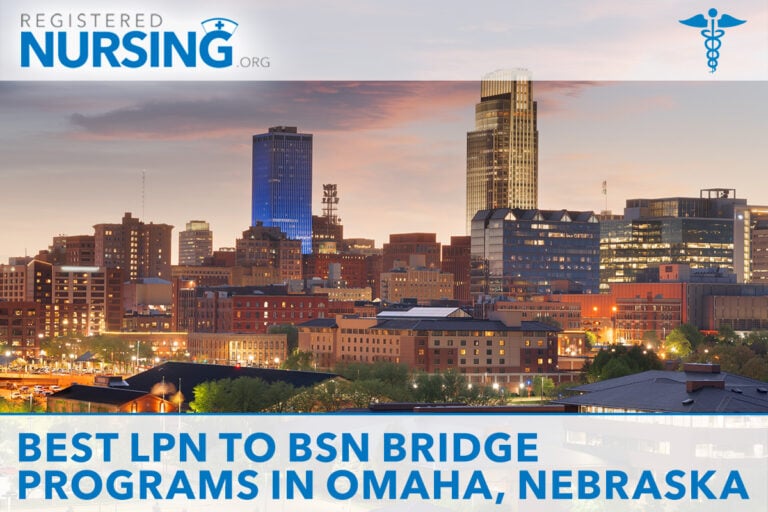Best LPN to BSN Bridge Programs Near Omaha, Nebraska: Compare Schools
- 2026 Best LPN to RN Programs Near Omaha, NE
- Why Choose an LPN to BSN Program in Omaha, NE
- How LPN to BSN Bridge Programs Work
- Typical Curriculum and Clinical Training
- Admissions Overview
- Tuition and Financial Aid
- Online and Hybrid LPN to BSN Programs in Nebraska
- Career Outlook for BSN-Prepared Nurses in Omaha
- Tips for Choosing the Right LPN to BSN Program
- Frequently Asked Questions (FAQs)
- Latest Articles & Guides

For working nurses in Omaha looking to move from Licensed Practical Nurse (LPN) to Registered Nurse (RN), an LPN to BSN program offers a smart and efficient way to advance. The Omaha metro area is a strong hub for nursing education, featuring top healthcare employers like Nebraska Medicine, CHI Health, and Methodist Health System, all of which value bachelor's-prepared nurses.
The LPN to BSN bridge pathway helps nurses leverage their existing education and clinical experience toward earning a Bachelor of Science in Nursing (BSN), a degree increasingly preferred across Nebraska hospitals.
In this article, you'll learn:
- The best LPN to BSN programs in the Omaha region
- How bridge programs work and what to expect
- Typical tuition costs and local clinical sites
- Online and hybrid study options for working nurses
- Career and salary outlooks for BSN graduates in Nebraska
2026 Best LPN to RN Programs Near Omaha, NE
Clarkson College
Omaha, NE - Private 4-year - clarksoncollege.edu
Bachelor's - LPN to BSN
Online & Campus Based - Visit Website
Clarkson College's LPN to BSN program offers licensed practical nurses a strategic two-year hybrid pathway to become registered nurses. This comprehensive program combines rigorous on-campus coursework with clinical experiences, allowing seamless transition to a bachelor's degree. Students benefit from small class sizes, 15 hours of validation credit for their PN license, and a final semester preceptorship in their chosen specialty. With consistently high NCLEX-RN pass rates, graduates are well-prepared for diverse healthcare settings. This bachelor's level program does not require ACT or SAT entrance exams.
- Completed in 6 semesters
- Unencumbered PN license required
- Small class and clinical sizes
- 15 hours validation credit
- Cost per credit: $671
- Full-time semester cost: $8,202
- Hybrid learning format
- Preceptorship in final semester
Nebraska Methodist College
Omaha, NE - Private 4-year - methodistcollege.edu
Bachelor's - Accelerated LPN to BSN Degree Program
Campus Based - Visit Website
Nebraska Methodist College's Accelerated LPN to BSN program provides licensed practical nurses with an efficient path to become Registered Nurses in 6-8 semesters. This CCNE-accredited program features a hybrid learning format with a competitive $350 per credit hour cost and requires a current LPN license with minimum 2.5 GPA. Students benefit from a remarkable 93.3% NCLEX pass rate and 96% employment rate within six months of graduation. The program emphasizes hands-on clinical training with a low 1:10 faculty-to-student ratio, preparing graduates for diverse healthcare settings. As a bachelor's level program, entrance exams like ACT or SAT are not mentioned as requirements.
- 6-8 semester completion time
- 93.3% NCLEX pass rate
- $350 per credit hour
- Hybrid learning format
- 1:10 faculty clinical ratio
- 96% post-graduation employment
- CCNE accredited program
- Minimum 2.5 GPA requirement
- Current LPN license needed
- Diverse healthcare career paths
Midland University
Fremont, NE - Private 4-year - midlandu.edu
Bachelor's - LPN to BSN Program Option
Online & Campus Based - Visit Website
Midland University's LPN to BSN program offers a six-semester hybrid pathway for licensed practical nurses to advance their careers. This program allows credit transfers for previous nursing coursework, including a specialized transition course that eases entry into the BSN curriculum. Designed for working professionals, the hybrid format combines online flexibility with in-person components, maintaining rigorous standards. As a bachelor's-level program, it may require ACT or SAT entrance exams, though specific requirements should be verified directly with the university. Graduates are prepared for advanced nursing roles, supported by the university's Evangelical Lutheran affiliation and military-friendly policies.
- Six-semester nursing program
- Hybrid learning format
- Credit transfer for LPNs
- Specialized transition course
- Pathway to advanced nursing roles
Why Choose an LPN to BSN Program in Omaha, NE
Omaha offers a strong healthcare environment for nursing students, with several accredited programs and a thriving job market for BSN-prepared nurses. The city's hospitals, rehabilitation centers, and community health systems are known for supporting educational advancement.
Benefits of earning a BSN in Omaha:
- Higher earning potential: RNs with BSNs earn approximately 20–25% more than LPNs, according to the Nebraska Department of Health and Human Services.
- Expanded career options: BSN-prepared nurses qualify for management, education, and advanced practice pathways.
- Employer support: Many Omaha healthcare employers offer tuition reimbursement or partnerships with nursing schools.
- Strong demand: Hospitals like Nebraska Medicine and CHI Health actively hire BSN-prepared nurses for clinical and leadership roles.
Did you know?
Nebraska's "Nursing Workforce Report" projects that demand for BSN-level nurses in the Omaha area will continue to rise through 2030, especially in hospitals and primary care.
Find out more about other nursing programs in Omaha, NE.
How LPN to BSN Bridge Programs Work
LPN to BSN programs are designed for nurses who already hold an active LPN license and want to advance their education to become a Registered Nurse. These bridge programs give students credit for prior learning and professional experience, helping them graduate faster than traditional BSN students.
Common features include:
- Advanced standing or credit for previous nursing coursework
- Combination of classroom, lab, and clinical instruction
- Hybrid or flexible scheduling for working professionals
- NCLEX-RN exam preparation
Most Omaha-area programs require 2 to 3 years of full-time study or up to 4 years of part-time study, depending on transfer credits and program structure. Students complete both general education and upper-level nursing courses while gaining hands-on experience in local healthcare settings.
Research nursing schools in Nebraska.
Typical Curriculum and Clinical Training
LPN to BSN students in Omaha study a mix of advanced nursing concepts, evidence-based practice, and leadership development. Clinical rotations allow them to apply new skills in real-world healthcare environments.
Sample Curriculum Overview
| Area | Example Courses | Local Application |
| Advanced Nursing Practice | Health Assessment, Pharmacology, Pathophysiology | Clinicals at CHI Health and Nebraska Medicine |
| Leadership and Management | Nursing Leadership, Evidence-Based Practice | Management roles in Omaha hospitals |
| Community and Family Health | Public Health Nursing, Family Systems | Service learning with Douglas County Health Department |
| Senior Practicum | Capstone Project, Clinical Immersion | Preceptorships at Methodist Health System |
Omaha Clinical Site Examples:
- Nebraska Medicine – University of Nebraska Medical Center (UNMC)
- CHI Health Creighton University Medical Center – Bergan Mercy
- Methodist Hospital and Methodist Women's Hospital
- Children's Hospital
- Veterans Affairs Medical Center, Omaha
These placements offer diverse experience in areas such as acute care, maternal health, pediatrics, and community nursing, providing essential preparation for the NCLEX-RN and future practice.
Admissions Overview
LPN to BSN program admissions are competitive but straightforward. Each school may vary slightly, but most in the Omaha area share similar requirements.
Typical Admission Requirements:
- Active, unencumbered LPN license in Nebraska
- Minimum GPA (usually 2.75–3.0)
- Completion of prerequisites (anatomy, physiology, microbiology, English, statistics)
- Official transcripts from prior institutions
- Background check, drug screen, and immunization records
- Letters of recommendation or professional references
Some programs also offer credit for prior learning assessments, allowing LPNs to earn advanced placement in the BSN curriculum.
Tuition and Financial Aid
Earning a BSN is an investment in long-term career advancement. Omaha offers several affordable pathways for LPNs, especially through public and hybrid institutions.
Example Cost Comparison
| Institution Type | Estimated Cost | Notes |
| Public University | $9,000–$14,000 per year | In-state tuition advantages for Nebraska residents |
| Private College | $15,000–$25,000 per year | Smaller class sizes, more personalized support |
| Online/Hybrid Option | $10,000–$18,000 total | Reduced commuting and flexible scheduling |
Financial Aid and Support Options:
- Nebraska Opportunity Grant (state-funded aid for residents)
- FAFSA (federal grants and loans)
- HRSA Nurse Corps Scholarship Program (for those serving in high-need areas)
- Employer tuition reimbursement (through CHI Health or Nebraska Medicine)
Many Omaha-area healthcare employers also offer loan repayment incentives for nurses who remain employed after graduation.
Online and Hybrid LPN to BSN Programs in Nebraska
Working nurses in Omaha have several flexible options to earn their BSN while maintaining employment. Online and hybrid programs combine remote coursework with in-person clinical training at local hospitals.
Examples of Online and Hybrid Options:
- Nebraska Methodist College: Offers a hybrid LPN to BSN program combining online theory courses with on-campus labs and local clinical rotations.
- Bellevue University: Provides online RN/BSN completion pathways with LPN entry options and clinicals arranged within the Omaha area.
- National Online Universities: Several accredited programs (e.g., Chamberlain, Purdue Global) partner with Omaha healthcare sites for local preceptorships.
Advantages of Online or Hybrid Formats:
- Flexibility for working nurses or those with family commitments
- Continued income while completing coursework
- Local partnerships for convenient clinical placements
Tip: Always verify that the online program is approved by the Nebraska Board of Nursing to ensure licensure eligibility after graduation.
Career Outlook for BSN-Prepared Nurses in Omaha
Omaha's healthcare industry is expanding, offering strong career prospects for BSN-prepared nurses. Hospitals increasingly prefer bachelor's-trained RNs for leadership and specialized roles.
Omaha RN Career Snapshot
| Metric | Detail |
| Average RN Salary | $78,000–$85,000 annually |
| Job Growth | 7–9% projected through 2030 |
| Major Employers | Nebraska Medicine, CHI Health, Methodist Health System, Children's Hospital |
| Common Job Titles | Registered Nurse (BSN), Clinical Coordinator, Nurse Educator, Case Manager |
Top Employers for BSN Graduates in Omaha:
- Nebraska Medicine – The state's largest academic health system
- CHI Health Creighton University Medical Center – Bergan Mercy – Focused on patient-centered care and research
- Methodist Health System – Known for women's and community health initiatives
- Douglas County Health Department – Employs BSN-prepared nurses in public and population health roles
With a BSN, graduates are also positioned to pursue advanced degrees such as an MSN or DNP, leading to roles as Nurse Practitioners or Nurse Educators.
Tips for Choosing the Right LPN to BSN Program
When comparing programs near Omaha, keep these key factors in mind:
Accreditation and Approval:
- Ensure the school is accredited by the Commission on Collegiate Nursing Education (CCNE) or Accreditation Commission for Education in Nursing (ACEN).
- Verify approval by the Nebraska Board of Nursing.
Program Format:
- Decide between traditional, hybrid, or fully online delivery based on your work schedule.
Clinical Partnerships:
- Look for schools that guarantee placements at reputable Omaha hospitals or health centers.
Outcomes and Support:
- Review NCLEX-RN pass rates, graduate employment rates, and student support services.
Questions to Ask Admissions Staff:
- How are credits from my LPN training evaluated?
- Can I complete clinicals at my current place of employment?
- Are evening or weekend classes available?
- What scholarships or tuition assistance programs do you offer?
Omaha is one of the best places in the Midwest to complete an LPN to BSN program, offering a combination of affordability, flexibility, and high-quality clinical experiences. Whether studying on campus or online, nurses in the region benefit from close partnerships between universities and major hospital systems.
Completing a BSN not only opens the door to higher pay and leadership roles but also contributes to the continued growth of Nebraska's healthcare system, where skilled, compassionate nurses are in high demand.
Frequently Asked Questions (FAQs)
Q: Which Omaha hospitals offer clinical placements for BSN students?
A: Common sites include Nebraska Medicine, CHI Health Creighton University Medical Center, Methodist Hospital, and Children's Hospital & Medical Center. Some programs also partner with the VA Medical Center and Douglas County Health Department.
Q: What is the average salary for BSN-trained RNs in Omaha?
A: RNs with a BSN in the Omaha area typically earn between $78,000 and $85,000 per year, with higher salaries available for those in leadership or specialty roles.
Q: Do I need to take the NCLEX-RN after completing an LPN to BSN program?
A: Yes. Graduates must pass the NCLEX-RN to obtain Registered Nurse licensure in Nebraska.
Latest Articles & Guides
One of the keys to success as a registered nurse is embracing lifelong learning. Our articles and guides address hot topics and current events in nursing, from education to career mobility and beyond. No matter where you are on your nursing journey, there’s an article to help you build your knowledge base.
Browse our latest articles, curated specifically for modern nurses.



